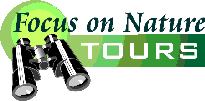
E-mail: font@focusonnature.com
Phone: Toll-free in USA 1-888-721-3555
or 302/529-1876
 |
PO
Box 9021, Wilmington, DE 19809, USA E-mail: font@focusonnature.com Phone: Toll-free in USA 1-888-721-3555 or 302/529-1876 |
A Focus On Nature Tour
in the
DOMINICAN
REPUBLIC
For Birds,
Butterflies,
and Other Nature
on the island of Hispaniola
in the Caribbean
March 15-22, 2014
(tour: FON/WI-3 '14)
Among the Birds, a number of
Hispaniolan Endemics and
Caribbean Specialties
including the Antillean Siskin & Hispaniolan Crossbill
Links:
Birds during previous FONT
Tours in the Dominican Republic
A
List & Photo Gallery of Caribbean Birds, in 2 Parts:
Part #1: Guineafowl to
Hummingbirds Part #2: Trogons to Buntings
Rare Birds of the Caribbean, Past & Present
Caribbean Butterflies (with some photos)
Mammals of the Caribbean (land & marine)
Marine Life of the Caribbean (including fish, corals, jellyfish, mollusks, arthropods)
Amphibians & Reptiles of the Caribbean (with some photos)
Previous
Dominican Republic Tour Highlights
Itinerary (price follows):
Sat: Mar 15: Arrival in the Dominican Republic. Our birding begins in Santo
Domingo, where we'll see the interesting and unique bird, the Palmchat.
And some other endemics and specialties as well, such as the Hispaniolan
Parakeet and Hispaniolan Woodpecker. Overnight in Santo Domingo.
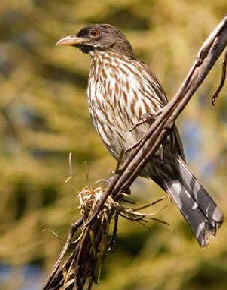
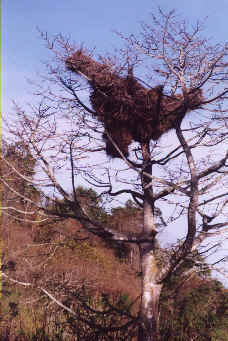
The Palmchat, the single
species in a unique family,
occurs no where else in the world other than on the Caribbean island of
Hispaniola.
It lives communally in large nests, as in the photo at right.
Sun: Mar 16: Travel westward, from Santo Domingo, along the southern coast
of the Dominican Republic, to the particularly fascinating and enjoyable area
that will be the locale for most of our birding. An area with seacoast, desert,
scrub, and forests of various sorts. With a lake, lower than the sea, and
mountains with pine forests at their tops. From the lake to the pines, one
particular road that passes through one habitat after another, along which many
of our sought-after birds will be found, as they have been during our tours in
the past. Overnight, this night, and through Feb 2 at Barahona,
by the sea.
Mon:
Mar 17 thru Thu: Mar 20: Birding
from Barahona, particularly in the Sierra de Bahoruco (or
the Bahoruco Mountains), where at higher elevations, Black-capped
Petrels nest.
Late in the day, in the rocky, forested hillsides, flocks of
Hispaniolan Parrots can be seen, as they have been during our previous
tours. Also, the beautiful Hispaniolan Trogon.
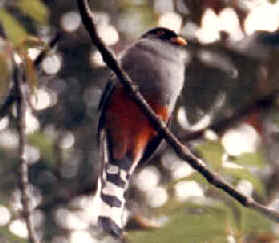
Hispaniolan Trogon
The rare La Selle
Thrush, White-winged Warbler, and Chat-Tanager will be sought. Golden
Swallows in the sky overhead. At dusk, the Least Poorwill and Hispaniolan
Nightjar. The crossbill in the pines, with white on its wings, now
considered endemic. Two species of todies: at higher elevations, the Narrow-billed;
at lower elevations, the Broad-billed. Also at lower elevations: Key
West Quail-Dove, Black-crowned Palm-Tanager, the Antillean or Hispaniolan
Piculet, and the Flat-billed Vireo, the latter thought at one time to
be a flycatcher. Flycatchers, themselves, include an elaenia
and a pewee.
At our lowest elevation, by Lago
Enriquillo, a large lake below sea-level, both of the species of
crows on the island are possible: the Hispaniolan Palm Crow and the White-necked
Crow. The largest concentration of flamingos in the Caribbean
occurs, on occasion, at Lago Enriquillo, a saline lake about 200 feet below
sea-level. Nearby, there should be Snowy and Wilson's Plovers.
At
a fresh-water lake, not far away we'll try for the West Indian Whistling-Duck
and a rail or crake. At another lake, near the ocean,
numerous birds should include: White-cheeked Pintail and various waders
including the Reddish Egret.
After dark at least one night, we'll aim for
Jamaican Potoo and Ashy-faced Barn-Owl. Also during this tour,
another night we'll make an effort for the Caribbean form of the Stygian Owl.
Early the following morning, we'll position ourselves for the recently-split White-fronted
Quail-Dove (which has been conspecific with the Gray-fronted
Quail-Dove of Cuba).
We'll also visit the area in the hills, where
during one of our previous tours, we were fortunate to see
soaring together 3 very rare Ridgway's Hawks. In all, lots of good
birding, and an enjoyable time, in an area surprisingly wild and remote.
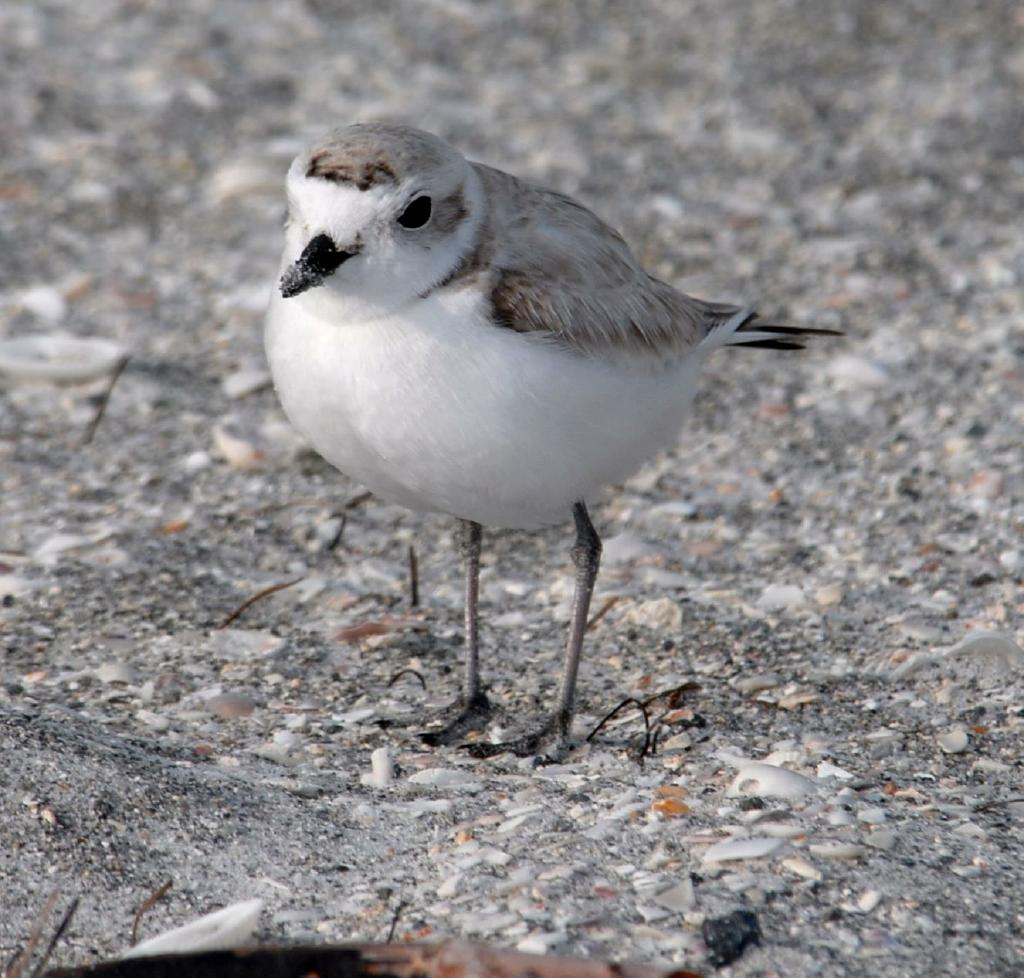
Snowy Plover
Fri:
Mar 21: After final morning birding in
the area of Barahona, travel back to Santo Domingo. Our last overnight there.
Sat, Mar 22: Flights
for home from the Dominican Republic.
![]()
Tour starts and ends at
the Santo Domingo airport in the Dominican Republic.
Price:
US $2,595 per person, based upon double-occupancy.
Single-supplement $295.
Includes:
All accommodations, meals (except dinners on Mar 15 & 21),
transportation on the island, and services of the guides.
Does not
include: Dinners on Mar 15 & 21. Drinks & any other
items of a personal nature. Gratuities. Air transportation: flights to/from the
Dominican Republic.
Tour to be led by
Armas Hill, and local birding guides.
A deposit of US $500 is required to reserve a place on the tour.